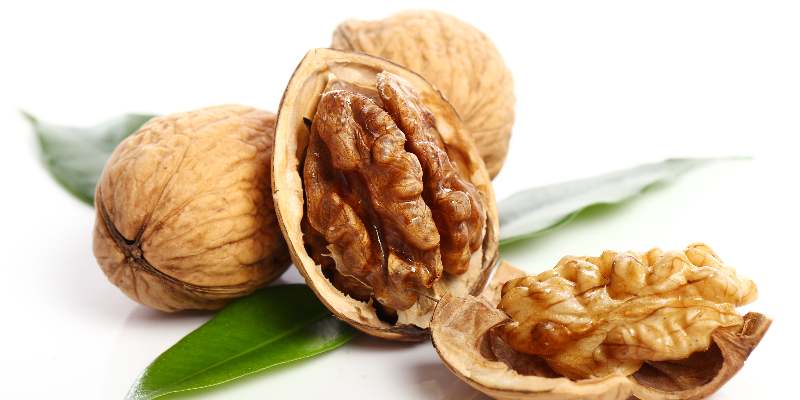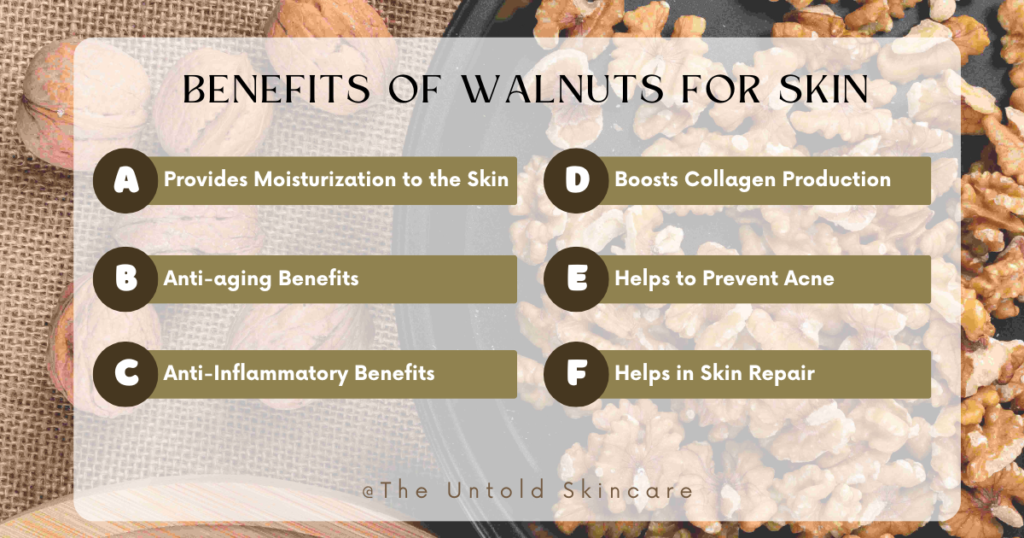When it comes to achieving healthy and glowing skin, nature often provides the best solutions.
One of nature’s hidden gems that has so much to offer for your skin health is Walnut.
Packed with extremely essential nutrients, walnuts offer a range of advantages when it comes to improving the health and appearance of your skin.
Walnuts are more than just a crunchy topping for oatmeal or your morning toast. From anti-aging properties to complexion clarity, walnuts may be the most underrated superfood out there!
So, let’s explore the amazing benefits of walnuts for skin and why they should become part of your daily diet to achieve healthy skin.
The Nutritional Contents of Walnut

Walnuts are a nutritious and healthy nut that is packed with a variety of essential nutrients. Here are some of the nutrients present in walnuts that promote healthy skin:
Omega 3 Fatty Acids
Walnuts are a good source of omega-3 fatty acids, particularly alpha-linolenic acid (ALA). These healthy fats help maintain the skin’s lipid barrier, which is essential for retaining moisture and keeping the skin supple. A healthy lipid barrier can help prevent dryness, flakiness, and irritation.
Vitamin E
Walnuts are rich in vitamin E, a powerful antioxidant. Vitamin E helps protect the skin from damage caused by free radicals and UV radiation. It also plays a role in promoting skin health by supporting skin cell regeneration.
Antioxidants
Walnuts contain various antioxidants, such as polyphenols and ellagic acid. These antioxidants can help combat oxidative stress, which can lead to premature aging of the skin. They also assist in reducing inflammation, which is often associated with skin conditions like acne and eczema.
Minerals
Walnuts provide essential minerals like zinc and selenium, which are important for skin health. Zinc, in particular, supports collagen production and wound healing, both of which are critical for maintaining healthy skin.
The Benefits of Walnuts for Skin
Here are 6 most important benefits of walnuts for skin health:

Provides Moisturization to The Skin
Walnuts are a good source of omega-3 fatty acids, particularly alpha-linolenic acid (ALA). These healthy fats are essential for maintaining the skin’s lipid barrier. The lipid barrier is a protective layer on the skin’s surface composed of lipids (fats) that help prevent water loss from the skin.
Omega-3 fatty acids in walnuts support the integrity of this barrier, reducing moisture loss and helping to keep the skin hydrated. This can prevent dryness, and flakiness, and promote a more hydrated complexion.
Anti-aging Benefits
Walnuts are rich in antioxidants, including vitamin E, polyphenols, and flavonoids. Antioxidants help combat free radicals, which are unstable molecules that can damage skin cells and accelerate the aging process.
By reducing oxidative stress, antioxidants in walnuts can help protect your skin from premature aging.
Also, the rich content of Omega-3 fatty acids helps to keep the skin cells healthy and promotes a more youthful appearance.
Provides Anti-Inflammatory Benefits
The omega-3 acids which are known for their anti-inflammatory properties can help reduce the production of pro-inflammatory molecules and promote the production of anti-inflammatory molecules in the body.

This can help lower systemic inflammation, which is linked to various skin conditions.
Walnuts also contain phytonutrients, such as ellagic acid and quercetin, which have anti-inflammatory properties. These compounds can help modulate the body’s inflammatory response and reduce the risk of chronic inflammation-related skin conditions.
Boosts Collagen Production
The nutrients in walnuts, including vitamin C and zinc, play a role in collagen production. Collagen is a protein that maintains the skin’s firmness and elasticity. A well-maintained collagen network can contribute to skin that appears more plump and hydrated.
Additionally, the anti-inflammatory properties of Walnuts help to prevent the breakdown of collagen and elastin fiber in the skin. Also, the proteins present in walnuts play a role in building new collagen fibers in the skin.
Helps to Prevent Acne
Acne is often associated with excess sebum (oil) production by the skin’s sebaceous glands.
Zinc, which is found in walnuts, plays a crucial role in regulating oil production. Consuming zinc-rich foods like walnuts may help balance sebum production, potentially reducing the risk of clogged pores and acne.
Acne being, in part, an inflammatory skin condition, the Omega-3 fatty acids present in walnuts can help reduce inflammation, which may lessen the severity of acne breakouts.
Helps in Skin Repair
Walnuts contain protein, which is essential for the regeneration and repair of skin cells. Protein provides the building blocks (amino acids) necessary for the synthesis of new skin tissue. Adequate protein intake supports the skin’s ability to heal from various types of damage, such as cuts, wounds, and abrasions.
Also, the anti-inflammatory properties of walnuts allow the skin to heal more effectively.
Also Read: 6 Essential Nutrients for Healthy Skin
Walnut Oil for Skin
In addition to eating walnuts, even just applying walnut oil can also significantly improve skin health.
Moreover, you can get the result even quicker by applying the oil rather than adding the nuts to your diet.
To use it, first, clean your face properly and pour a small amount of walnut oil on palm of your hand. Rub your palms and gently massage the oil onto your face.
Walnut Face Scrub
A walnut face scrub typically contains ground walnut shells or walnut powder as an exfoliating agent. These products are designed to help remove dead skin cells, unclog pores, and promote smoother, brighter skin.
However, using any kind of physical scrub is a big NO in skincare. The abrasive particles present in scrub can be extremely harsh on the skin leading to microtears on skin’s surface. This can weaken the skin’s barrier function and lead to increased sensitivity, redness, and inflammation.
So, irrespective of what they are made from, face scrubs should be avoided and should never be a part of your skincare routine.
The Benefits of Walnut Shell Powder
Walnut shell powder provides physical exfoliation, benefiting in effective removal of dead skin cells, dirt, and debris from the surface of the skin. But, it should never be used for face as it can be too harsh for face skin.
However, it can be useful for reducing rough or calloused skin on areas like elbows and knees. It is widely used to remove dark skin in regions like underarms, knees, elbows, and neck.
Recommended Daily Dose of Walnut

While there isn’t a specific daily dose of walnuts recommended solely for improving skin health, incorporating a moderate amount of walnuts into your daily diet can contribute to better skin health over time.
A general guideline is to consume about 1 to 1.5 ounces (28 to 42 grams) of walnuts per day, which is roughly a small handful.
Possible Side Effects of Using Walnuts for SKincare
The dietary consumption of walnuts is quite safe for anyone and is not reported to have shown any kind of side effects. However, in some rare cases, the topical application of walnut-based products can be slightly problematic to few people.
Some individuals may be allergic to tree nuts, including walnuts, thus causing slight skin irritation.
Also, walnut oil is rich and can be quite heavy and may lead to clogged pores or breakouts in some people, especially if you have oily or acne-prone skin. So it’s best used in moderation. However, the chances of that happening are still too low.
Also Read: 7 Best Fruits for Skin Health
Frequently Asked Questions
1. How to use walnuts for skincare?
You can either consume it or use any walnut-based product. It is extremely effective both ways.
2. How walnut can help with acne?
The anti-inflammatory property of walnuts helps to lessen the severity of acne breakout. Also, the rich content of zinc in walnuts helps to regulate sebum production which in turn, reduces the potential risk of clogged pores and acne. This way, walnuts can help with acne.
3. Does walnuts help in skin whitening?
While walnuts offer several potential benefits for skin health, they do not have the ability to change your skin’s natural pigmentation or lighten it. Also, there is no scientific evidence to support that claim.
4. How Walnuts can help with anti-aging?
The anti-oxidants present in Walnuts can help to combat the free radicals protecting your skin from premature aging. Also, other various nutrients present in it help keep the skin cells healthy, thus promoting a youthful appearance.
5. Is it better to soak walnuts before eating it?
Soaking the walnut before eating it is indeed a good practice as it improves digestibility and can also enhance nutrient absorption.





